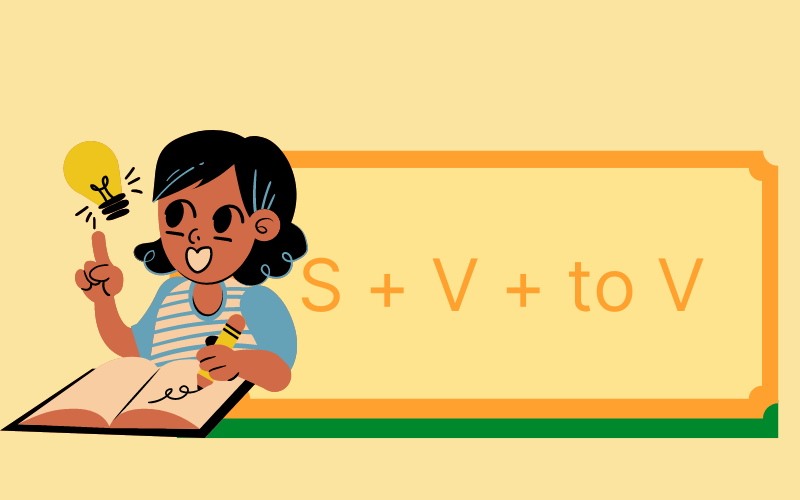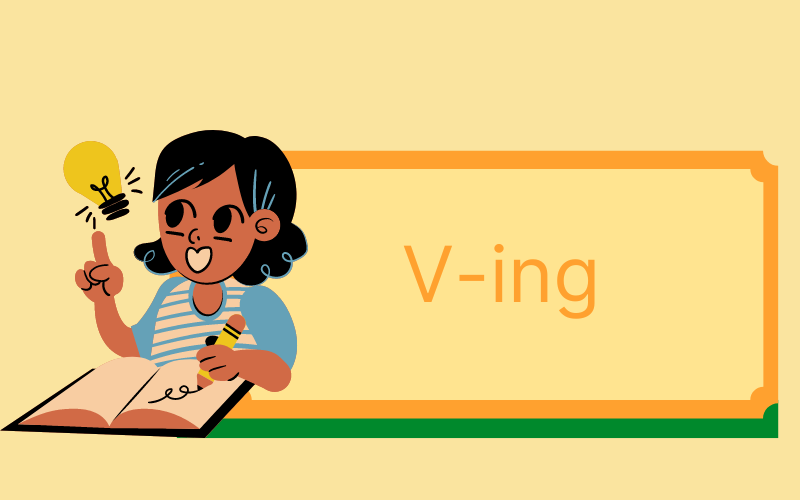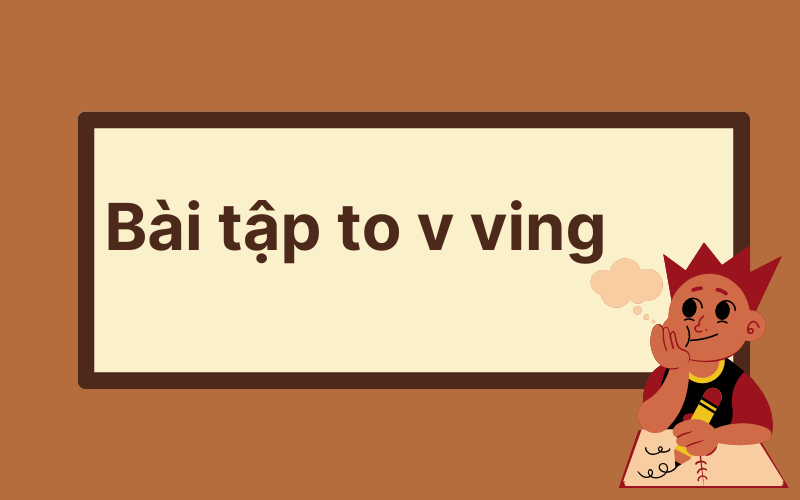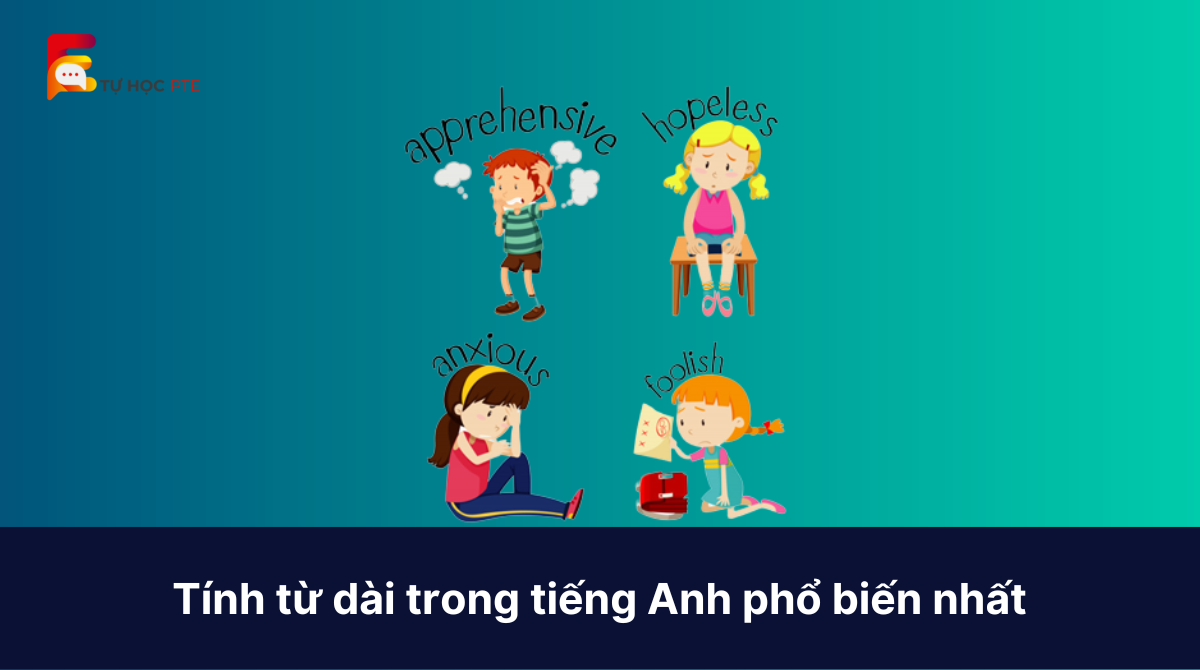To V và Ving là 2 chủ đề ngữ pháp mà nhiều người nhầm lẫn. Vì vậy Tự học PTE đã tổng hợp ngữ pháp và bài tập to v ving để bạn rèn luyện. Bài tập đi kèm đáp án để bạn có thể kiểm tra trình độ của bạn, làm bài thôi nào.
Nội dung
Những động từ theo sau là to V
Có 2 trường hợp:
Công thức: S + V + to V
Bên dưới là một số theo sau là “to V” trong tiếng Anh:
- Afford: đủ khả năng
- Appear: xuất hiện
- Arrange: sắp xếp
- Fail: thất bại
- Bear: chịu đựng
- Begin: bắt đầu
- Choose: lựa chọn
- Decide: quyết định
- Expect: mong đợi
- Hesitate: do dự
- Intend: dự định
- Learn: học hỏi
- Manage: thành công
- Neglect: thờ ơ
- Offer: đề nghị

- Prepare: chuẩn bị
- Propose: đề xuất
- Pretend: giả vờ
- Promise: hứa
- Refuse: từ chối
- Seem: dường như
- Swear: thề
- Want: muốn
- Wish: ước
Công thức: S + V + O + to V
- Advise: khuyên
- Ask: hỏi
- Allow: cho phép
- Appoint: bổ nhiệm
- Beg: van xin
- Cause: gây ra
- Convince: thuyết phục
- Compel: cưỡng bách, bắt buộc
- Choose: lựa chọn
- Charge: giao nhiệm vụ
- Challenge: thách thức
- Dare: dám
- Direct: hướng dẫn, chỉ huy
- Desire: ao ước, thèm thuồng
- Encourage: động viên
- Expect: mong đợi
- Forbid/ ban: cấm
- Force: ép buộc

- Invite: mời
- Instruct: hướng dẫn
- Implore: yêu cầu
- Hire: thuê
- Mean: nghĩa là
- Need: cần
- Order: ra lệnh
- Permit: cho phép
- Persuade: thuyết phục
- Remind: nhắc nhở
- Request: yêu cầu
- Recommend: khuyên
- Require: đòi hỏi
- Teach: dạy
- Tempt: xúi giục
- Tell: bảo
- Urge: thúc giục
- Want: muốn
- Wish: ước
- Warn: báo trước
Xem thêm:
Những động từ theo sau là “V-ing”
- Anticipate: Tham gia
- Avoid: Tránh
- Admit: chấp nhận
- Consider: cân nhắc
- Continue: tiếp tục
- Delay: Trì hoãn
- Discuss: thảo luận
- Dislike: ko thích
- Deny: từ chối
- Enjoy: thích
- Imagine: tưởng tượng
- Involve: bao gồm
- Hate: ghét
- Keep: giữ

- Love: yêu
- Mind: quan tâm
- Mention: đề cập
- Postpone: Trì hoãn
- Practice: thực hành
- Quit: Bỏ
- Recall: nhắc
- Resent: gửi lại
- Resist: chống cự
- Suggest: gợi ý
- Tolerate: cho phép
- Understand: hiểu
- Urge: thúc giục
Bên cạnh đó còn có những cụm từ bên dưới theo sau là V-ing:
- It’s no use/It’s no good…
- There’s no point (in)…
- It’s (not) worth…
- Have difficult (in)…
- It’s a waste of time/money…
- Spend/waste time/money…
- Be/get used to…
- Be/get accustomed to…
- Do/Would you mind…?
- Be busy doing something…
- What about…? How about…?
Bài tập to v ving trong tiếng Anh
Bên dưới là tổng hợp các bài tập to v ving trong tiếng Anh mà các bạn có thể luyện tập. Bài tập có sẵn đáp án, bạn hãy làm bài và kiểm tra lại đáp án bên dưới luôn nhé.
Phần bài tập to v ving
Bài tập 1: Viết vài dòng về bản thân bạn. Cho biết bạn thích hay không thích những hoạt động này. Chọn một trong những động từ cho mỗi câu
like/ don’t like love hate enjoy don’t mind
1. (fly) I don’t like flying or I don’t like to fly.
2. (play cards) ………………………………
3. (be alone) ………………………………..
4. (go to museums) ……………………………
5. (cook) ……………………………………
Bài tập 2: Đặt câu từ các từ trong ngoặc. Sử dụng –ing hoặc to…. Trong một số trường hợp có thể sử dụng một trong hai dạng.
1. Paul lives in Berlin now. It’s nice. He likes it.
(he/like/live/there) He likes living there.
2. Jane is a biology teacher. She likes her job.
(she/like/ teach/ biology) She ………………….

3. Joe always carries his camera with him and takes a lot of photographs.
(he/like/ take/photographs) …………………….
4. I used to work in a supermarket. I didn’t like it much.
(i/ not / like / work / there) ………………….
5. Rachel is studying medicine. She likes it .
(she/like/study/ medicine) ……………………..
6. Dan is famous, but he doesn’t like it.
(he/not / like/ be/ famous) …………………….
7. Jenifer is a very cautions person. She doesn’t take many risks.
(she / not / like / take / risks) ……………….
8. I don’t like surprises.
(I/like know/things/in advance) …………………
Xem thêm:
Bài tập 3: Bài tập to v ving hoàn thành câu với một động từ ở dạng đúng, -ing hoặc to…
1. It’s good to visit other places – I enjoy travelling.
2. “Would you like …. down?” “No thanks. I’ll stand.”
3. I’m not quite ready yet. Would you mind …. a little longer?
4. When I was a child, I hated …. to bed early.
5. When I have to catch a train, I’m always worried that I’ll miss it. So I like …. to the station in plenty of time.
6. I enjoy …. busy. I don’t like it when there’s nothing to do.
7. I would love …. to your wedding, but I’m afraid it isn’t possible.
8. I don’t like …. in this part of town. I want to move somewhere else.
9. Do you have a minute? I’d like …. to you about something.
10. If there’s bad news and good news, I like …. the bad news first.
Bài tập 4: Viết câu sử dụng would …. to have. Sử dụng động từ trong ngoặc
1. It’s a pity I couldn’t go to the wedding.
(like) I would like to have gone to the wedding.
2. It’s a pity I didn’t see the programme.
(like) ……………………………
3. It’s glad I didn’t lose my watch.
(hate) ……………………………
4. It’s a pity I didn’t meet your parents.
(love) ……………………………
5. I’m glad I wasn’t alone.
(not/like) ………………………..
6. It’s a pity I couldn’t travel by train.
(prefer) ………………………….
Bài tập 5: Chia động từ trong ngoặc
- I can’t imagine Peter _____ (go) by bike.
- He agreed _____ (buy) a new car.
- The question is easy _____ (answer).
- The man asked me how _____ (get) to the airport.
- I look forward to _____ (see) you at the weekend.
- Are you thinking of _____ (visit) London?
- We decided _____ (run) through the forest.
- The teacher expected Sarah _____ (study) hard.
- She doesn’t mind _____ (work) the night shift.
- I learned _____ (ride) the bike at the age of 5.
Bài tập 6: Đặt động từ ở dạng đúng –ing hoặc to …
1. They denied stealing the money. (steal)
2. I don’t enjoy …. very much. ( drive)
3. I don’t want …. out tonight.I’m too tired. (go)
4. I can’t afford …. out tonight. I don’t have enough money. (go)
5. Has it stopped …. yet? (rain)
6. Our team was unlucky to lose the game. We deserved …. (win)
7. Why do you keep …. me questions? Can’t you leave me alone. (ask)
8. Please stop …. me questions! (ask)
9. I refuse …. any more questions. (answer)
10. One of the boys admitted …. the window. (break)
11. The boy’s father promised …. for the window to be rapaired. (pay)
12. If the company continues …. money the factory may be closed. (lose)
13. Does Sarah know about the meeting? No,I forgot …. her. (tell)
14. The baby began …. in the middle of the night. (cry)
15. Julia has been ill but now she’s beginning …. better. (get)
16. I’ve enjoy …. you. I hope …. you again soon. (meet, see)
Phần đáp án bài tập to v ving
Đáp án bài tập 1
Đáp án gợi ý:
2. I don’t mind playing cards
3. I don’t like being alone
4. I enjoy going to museums
5. I love cooking

Đáp án bài tập 2
2. She likes teaching biology.
3. He likes taking photographs.
4. I didn’t working there.
5. She likes studying medicine.
6. He doesn’t like being famous.
7. She doen’t like taking risks.
8. I like to know things in advance.
Đáp án bài tập 3
| 2. to sit | 3. waiting | 4. going | 5. to get | 6. being |
| 7. to come | 8. living | 9. to talk | 10. to have |
Đáp án bài tập 4
2. I would like to have seen the programme.
3. I would have lost my watch.
4. I would love to have met your parents.
5. I would n’t like to have been alone.
6. I would prefer to have travelled by train.
Đáp án bài tập 5
| 1. going | 2. to buy | 3. to answer | 4. to get | 5. seeing |
| 6. visiting | 7. to run | 8. to study | 9. working | 10. to ride |
Đáp án bài tập 6
| 2. driving | 3. to go | 4. to go | 5. raining | 6. to win | 7. asking | 8. asking | 9. to answer |
| 10. breaking | 11. to pay | 12. losing | 13. to tell | 14. crying or to cry | 15. to get | 16. meeting …. to see |
Phía bên trên là kiến thức về to v ving và bài tập to v ving có đáp án chi tiết. Bài tập này sẽ giúp bạn củng cố ngữ pháp đã học trước đó và chuẩn bị tốt cho bài thi sắp tới. Nếu còn có bất kỳ thắc mắc nào trong quá trình làm bài, bạn hãy để lại bình luận bên dưới bài viết của Tự học PTE nhé.




